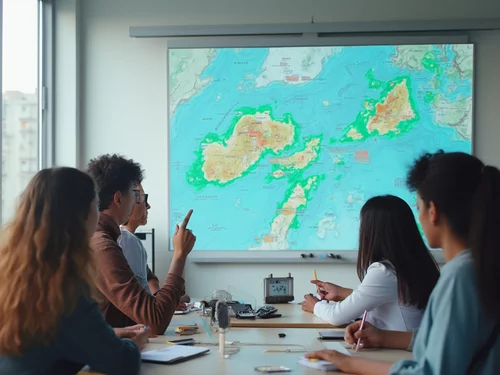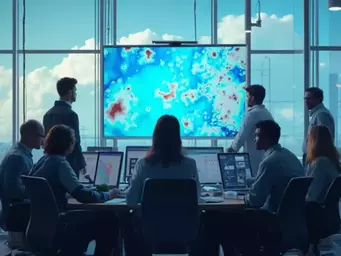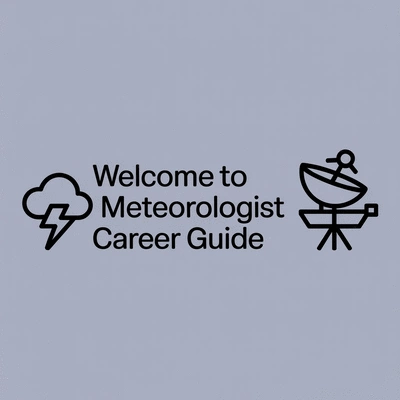Considering a career in meteorology? As the demand for skilled professionals continues to rise, understanding the necessary skills and educational pathways is crucial. Dive into the world of weather science and uncover what it takes to thrive in this dynamic field.
What You Will Learn
- Meteorology courses equip you with essential knowledge and practical skills relevant across various industries.
- Key skills for success in meteorology include data analysis, communication, technical proficiency, and adaptability.
- Engagement with organizations like NOAA and NWS can enhance your educational experience and career prospects.
- Choosing the right meteorology course involves evaluating personal interests, comparing offerings, and researching instructors.
- Networking opportunities, such as attending conferences and joining professional societies, are vital for career advancement in meteorology.
Key Skills & Resources for Meteorologists in 2025
The following visual outlines crucial skills for success in meteorology in 2025 and key organizations that support professional development in the field.
Understanding Meteorology Skill Development in 2025
As a passionate meteorologist and educator, I recognize that the landscape of meteorology is constantly evolving. In 2025, aspiring meteorologists will need to develop a diverse set of skills to stay relevant in this dynamic field. Choosing the right educational pathways is crucial to building a successful career in weather science.
So, why choose courses in meteorology? With climate change driving increased demand for skilled meteorologists, there has never been a better time to invest in your education. Not only do meteorology courses provide essential knowledge of weather systems, but they also equip you with practical skills that are highly sought after in various industries.
Why Choose Courses in Meteorology?
Enrolling in meteorology courses can open doors to numerous opportunities. Here are some compelling reasons to consider these courses:
- Real-World Applications: Understand how weather affects agriculture, transportation, and safety.
- Diverse Career Paths: From forecasting to research and education, the options are vast.
- Impactful Work: Your skills can help communities prepare for extreme weather events.
By pursuing a qualification in meteorology, you not only gain expertise in observing and predicting weather patterns but also contribute positively to society's understanding of climate-related challenges.
Identifying Key Skills for Meteorology Professionals in 2025
As we look ahead, it’s essential to pinpoint the skills that will define successful meteorologists in 2025. The following key skills are crucial for anyone looking to thrive in this field:
- Data Analysis: Proficiency in interpreting meteorological data and trends is vital.
- Communication: Clear communication of complex weather information to the public is essential.
- Technical Proficiency: Familiarity with the latest technology and modeling software enhances forecasting accuracy.
- Adaptability: The ability to adjust to rapidly changing environmental conditions will set you apart.
Developing these skills early on will significantly boost your employability in a competitive job market. Remember, continuous learning is key in a field as dynamic as meteorology!
The Role of NOAA and NWS in Meteorology Education
The National Oceanic and Atmospheric Administration (NOAA) and the National Weather Service (NWS) play a crucial role in shaping meteorology education. These organizations provide valuable resources, research, and insights that help students and professionals alike. Here’s how they contribute:
- Educational Resources: They offer webinars, workshops, and comprehensive guides on various meteorological topics.
- Research Opportunities: NOAA and NWS engage students in real-world research projects that enhance learning.
- Career Guidance: They provide career support and networking opportunities for aspiring meteorologists.
By engaging with NOAA and NWS materials, you can enrich your educational experience and gain a deeper understanding of the field's practical applications. It's a valuable step toward becoming a competent and informed meteorologist!
Interactive Poll: Your Meteorology Interests
As you consider your journey into the field of meteorology, we want to know: What aspect of meteorology excites you the most? Share your thoughts below:
Making Informed Decisions on Meteorology Courses
Choosing the right meteorology course can feel overwhelming, especially with the many options available today. It's essential to evaluate your personal interests and career goals when selecting a program. For example, Harvard University offers a "Backyard Meteorology: The Science of Weather" course that could be a great starting point for those interested in the fundamentals. Here are some key takeaways to help you make an informed decision:
- Identify Your Interests: Consider what aspects of meteorology excite you most—forecasting, climate science, or data analysis.
- Compare Course Offerings: Look for programs that align with your interests and offer practical skills as well as theoretical knowledge.
- Research Instructors: Check the qualifications and experience of the instructors; seasoned professionals can provide invaluable insights.
- Read Reviews: Look for feedback from past students to gauge the quality of the course and learning experience.
By focusing on these key areas, you can better navigate the myriad of choices and select a course that resonates with your aspirations in meteorology.
Next Steps to Get Started in Your Meteorology Journey
Once you've identified the right course, it's time to take actionable steps to launch your career in meteorology. Here’s a simple roadmap to guide you:
- Enroll in Your Chosen Course: Secure your spot in the program that suits your needs.
- Gather Study Materials: Collect textbooks, online resources, and any equipment you might need for your classes.
- Network with Peers: Connect with fellow students and professionals in the field; building relationships can open doors.
- Seek Internships: Look for internship opportunities to gain practical experience and enhance your resume.
Taking these steps will set you on a solid path toward a rewarding career in meteorology. Remember, the journey may seem long, but each step you take is crucial in shaping your future in this exciting field!
Engaging with the Meteorology Community
As you embark on your meteorological journey, engaging with the community is vital for growth and learning. Connecting with other professionals can lead to valuable insights, mentorship opportunities, and collaborations.
Opportunities for Networking and Professional Development
Networking is a powerful tool in advancing your career. Here are some opportunities to consider:
- Attend Conferences: Participate in meteorology conferences to meet experts and learn about the latest research.
- Join Local Meetups: Find or create local groups focused on meteorology topics to share knowledge and experiences.
- Engage on Social Media: Follow meteorology professionals on platforms like LinkedIn and Twitter to stay updated and connect.
These interactions can foster meaningful relationships that support your professional journey in meteorology.
Join Professional Societies like AMS for Ongoing Learning
Becoming a member of professional organizations like the American Meteorological Society (AMS) can provide numerous resources:
- Access to Research Publications: Stay current with the latest findings in meteorology.
- Discounted Course Rates: Enjoy savings on educational programs and certifications.
- Networking Events: Gain access to exclusive events where you can meet leaders and innovators in the field.
Being part of such organizations keeps you engaged and informed, which is essential as you build your career in meteorology.
Leveraging Resources from the National Hurricane Center and WMO
The National Hurricane Center and the World Meteorological Organization (WMO) offer a wealth of resources for aspiring meteorologists:
- Training and Workshops: Participate in workshops that focus on specific meteorological skills.
- Data Access: Utilize datasets for research and learning opportunities to enhance your analytical skills.
- Educational Materials: Take advantage of free educational content available through their websites.
By leveraging these resources, you can enhance your understanding of meteorology and stay engaged with current events and developments within the field.
Frequently Asked Questions (FAQs)
- What key skills are essential for meteorologists in 2025?
- Essential skills include data analysis, communication, technical proficiency (especially with modeling software), and adaptability to rapidly changing conditions.
- Why should I consider a career in meteorology?
- Meteorology offers real-world applications, diverse career paths (forecasting, research, education), and the opportunity for impactful work, such as helping communities prepare for extreme weather events.
- How do NOAA and NWS support meteorology education?
- Both NOAA and NWS provide educational resources like webinars and guides, offer research opportunities for students, and provide career guidance and networking support.
- What should I consider when choosing a meteorology course?
- When choosing a course, you should identify your personal interests, compare course offerings, research the qualifications and experience of instructors, and read reviews from past students.
- What are the benefits of joining professional societies like the American Meteorological Society (AMS)?
- Joining professional societies like AMS provides access to research publications, discounted rates on educational programs, and exclusive networking events with leaders and innovators in the field.
Recap of Key Points
Here is a quick recap of the important points discussed in the article:
- Educational Pathways: Pursuing meteorology courses is crucial due to the growing demand for skilled professionals in the field.
- Key Skills Development: Essential skills such as data analysis, communication, technical proficiency, and adaptability are vital for success in meteorology.
- Engagement with Organizations: Utilizing resources from NOAA, NWS, and professional societies like AMS can enhance your educational experience and networking opportunities.
- Informed Course Selection: Evaluate your interests and career goals when choosing the right meteorology program to ensure it aligns with your aspirations.
- Networking Opportunities: Attend conferences, join local meetups, and connect with professionals through social media for valuable insights and mentorship.










